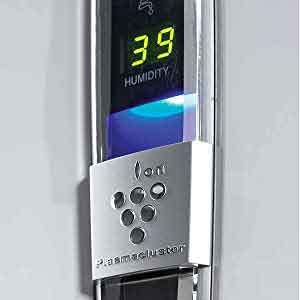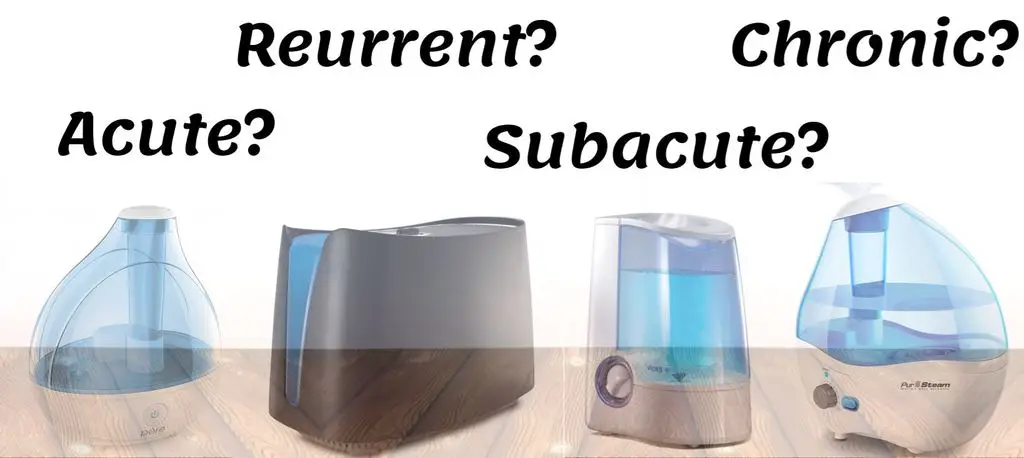Best Humidifier for Sinus Problems: Get Rid of Congestion and Infections!
As an Amazon Associate, I may earn from qualifying purchases at no extra cost to you.

Once again I find myself looking for the best humidifier for sinus problems. Allergy season has arrived, and a sinus infection has once again been taking its toll on me.
Sinusitis is horrible, and this usually means flu like symptoms: tenderness/pressure around the nose, cheeks, and forehead regions, runny/stuffy noses, coughs, fatigue, and in some instances body aches!
Many do not realize that the issue lies with the air they breathe, which is being untreated.
This can not only affect your health but the health of your loved ones too.
"The answer lies in the humidity and a humidifier can help solve that"
So what can you do? The answer lies in the humidity and a humidifier can help solve that.
More...
At a Glance: Our Top Picks of Humidifiers for Sinus Problems
Humidifiers help to regulate the level of moisture in the air you breath and are especially helpful when sleeping, providing relief from sinus pain and inflammation by increasing the moisture in the air - which often tends to be too dry.
They have been a huge help for my family and I.
Having sieved through many models thoroughly, here are the best humidifiers for sinus problems that have been carefully picked for you to ensure you have all the information you need when choosing your next humidifier.
Trust me, place one of these in your bedroom at night and your sinuses will thank you later.
Best Humidifiers for Sinus Problems
- 1.1 gal tank offers 10 hrs of continuous operation
- Plasmacluster ions & triple filtration system effectively eliminate bacteria, viruses, mold & fungus
- Our choice for sinus problems
- Coverage: Up to 800 ft²
- Filter-free, energy efficient operation produces no ions, ozone, or white dust
- Perfect for medium to large rooms
- Releases moisture up to 150 ml/hr
- Coverage: Up to 250 ft²
- Best Seller
- Whisper Quiet Operation
- Releases moisture up to 350 ml/hr
- Excellent for light sleepers or nappers like night-shift workers, seniors, babies, college students
- 1 gal (3.8 l) tank runs for up to 24 hrs
- UV technology kills up to 99.9% of bacteria in the water
- Amazon's choice
OVERALL BEST HUMIDIFIER FOR SINUS PROBLEMS:
#1 SHARP KC860U PlasmaCluster
At the top of the list is the KC-860U - an air purifier with a built-in humidifier which is years ahead of its competitors.
Those with immense pressure or heavy congestion can find comfort in KC-860U’s triple air purification system.
With a permanent pre-filter, washable dedorizing filter, and True HEPA filter working together, (1) large particles such as pet hairs and visible dust, (2) light household odors, and (3) up to 99.97% of airborne allergens (eg: pollen, dust mites, mold spores, and more) may be removed from the environment.

In short, the culprits triggering sinusitis are targeted. A huge plus point in our books.
On top of its filters, the unit also gives you the option of using their signature Plasmacluster ionizer for added allergen-removing power.
The entire air cleaning process involves an ultra-quiet but powerful fan, which is virtually inaudible while running but still maintains high performance.
This unit displays the air quality and humidity levels, and adjusts its operation settings through smart sensors according to these levels, thus providing optimum air cleaning and humidity.
The lack of control in adjusting humidity settings was a sticking point for some buyers, but many found the precise auto adjustments a welcomed one.
In addition, with an easily removed water tank, there is no extra burden to you when refilling, just wonderful humidification.
One downside is that the KC-860U is backed only by a 1-year warranty which also covers repairs and replacements.

Often, a short warranty gives you an inkling of how durable a product is. However, most users report that this model has served them well beyond the warranty period!
Other Great Humidifiers for Sinus Problems (Honorable Mentions)
#2 Venta LW45 Airwasher 2-in-1 Humidifier and Air Purifier
#3 Pure Enrichment MistAire Ultrasonic Cool Mist Humidifier
#4 PurSteam Ultrasonic Cool Mist Humidifier
#5 Honeywell Germ Free Cool Mist Humidifier (HCM350B)
What to Consider when Buying the Best Humidifier for Sinus Problems
Run-time
Using the water stored in its tank, each humidifier is able to dispense moisture for a specific amount of time before the water runs out.
This also give you a gauge of how often you need to refill the tank.
This usually depends on factors such as tank capacity, efficiency of the unit, and mist setting.
In general, the more water being stored, the greater the run-time.
If a humidifier has just one setting, then the mist output will be constant, meaning it will run for a specific amount of time.
However, models that offers more than one mist mode, such as Pure Enrichment's MistAire humidifier, have varying runtimes depending on the selected output level.
The MistAire is efficient in that it can run 16 hours on its highest output, not something that many units can boast.
While other humidifiers, such as, HoMedics Personal Ultrasonic humidifier, can offer just 4 hours of run-time, which may still be enough depending on its purpose.
Tank Capacity
Small units have smaller capacities. Larger units such as the AIRCARE MA1201 have a staggering 3.6 gal tank which can last up to 36 hrs.
We've mentioned that tank capacity is one of the key factors in a humidifiers run-time.
But not everyone may want the largest tank. It depends on your needs.
Do you want one that can run for 2-3 days without refilling? Bear in mind that the longer water stays in the tank, the higher the chances mold can grow.
Mold growth is bad and can trigger sinus allergies, and cause skin rashes and itchy eyes.
So while a large tank sounds great, consider the use of a filtration system that can trap lime scale and other particles.
Some units are also made of plastic that prevent mold build-up.
That does not mean to say that you should clean your humidifier less often.
A good practice is to clean the humidifier at least once a day and replace it with fresh water.
Ability to Filter Germs & Bacteria
Bacteria, germs, and dander in the air can still contribute to sinus allergies and problems.
Because of how they work, most ultrasonic humidifiers do not have any filters, so you may want to find a humidifier that has one.
Filters not only help to prevent mold buildup, but also help to filter particles like pollen and dander.
Something for those with allergies or are more sensitive to consider.
On the other hand, if you want a low-maintenance humidifier, filterless units can also be good choices. Simply use distilled water on it.
Ease of Cleaning
As mentioned above, stagnant water can be a breeding ground for mold and bacteria.
Having a unit that is easy to clean will make cleaning it less of a chore.
Look out for units that have nooks or crannies that may foster mold build-up.
Alternatively, some humidifiers also come with cleaning brushes specific to that model for those hard to reach places.
Some units are also made of materials resistant mold and mildew formation.
A rule of thumb is to go for a model that you'd be willing to clean - typically one that is more accessible will encourage this.
Never let your water sit, and always empty and clean the tank when not in use.
Type of Water
For some units, using tap water can result in mineral residue ("white dust") forming in the tank and around the room.
White dust can promote bacterial growth which can be harmful to you.
For these cases, simply use distilled, demineralized, or purified water and you're good to go.
There are humidifiers that are able to handle tap water (typically those with filters), so be sure to check the manufacturer's instructions for the type of water that can be used with the unit.
Warm or Cool Mist?
Both warm and cool mist humidifiers have their pros and cons.
Hot mist can be more comfortable and warm the room up slightly if its cold. Water is heated up which also kills bacteria, making the mist cleaner to inhale.
However, warm mist is not recommended for homes with kids and pets as the boiling water inside could be a danger to them, especially babies if you intend to place the unit in a nursery.
Cool mist humidifiers are ideal for homes with kids or pets and typically consume less electricity than its warm mist counterparts.
Ultimately, for sinuses, there are no significant differences between a warm or cool mist humidifier. By the time the mist reaches your respiratory tract, the effects are equally effective.
Ideal Humidity Level
For sinuses, the humidity should optimally be set at 45-55%. That's why it's important to have a humidity gauge.
Similar to an air conditioner which maintains the temperature at your desired level, some humidifiers have in-built humidistats that can help you maintain the humidity at an optimal level for your sinuses.
It measures the humidity level, and once it reaches a set limit, shuts off.
An important feature for accuracy.
Hygrometers, also serve the same purpose and can accurately measure you rooms humidity.
I recommend getting the ThermoPro TP50 Digital Hygrometer - it's a nice little device that does the job. Alternatively, go with what feels the best for you!
Noise
One factor worth considering is also the noise that your humidifier produces.
While you want to dispense moisture into the air, the unit doing so should not be a nuisance.
Sinus issues can be more prominent in the night. So, chances are you'll want to have your humidifier with you when you sleep.
If you hear your humidifier humming loudly near your bed, you wont be able to sleep well!
So pay attention to the level of noise that the humidifier you are buying produces.
Other Factors
Do Humidifiers Really Help with Sinus Infections?

For this it depends on what you are looking for. If you are asking if humidifiers work to totally eliminate sinus infections, then the answer will be no, they don't.
Build-up of germs and bacteria can lead to sinus infections. This is exacerbated when mucus stops flowing (often due to inflammation from allergies, colds, or pollution).
But what a humidifier can do, is help to prevent and ease the symptoms of a sinus infection. This is because humidity has a role to play in ensuring that mucus flows better.
Because naturally flowing mucus helps to remove germs and bacteria in our sinuses, having the humidity at an optimal level also acts as a protective factor against sinus inflammation and infection.
A humidifier works to ensure that the air is sufficiently moist.
When the air we breathe in is moist, the natural flow of mucus is encouraged, which will carry away germs and bacteria before inflammation can set in.
Moreover, if an infection has already set it, humidifiers can help to provide relief by clearing up sinus congestion.
Types of Sinus Infections

There are 4 types of sinus infections (sinusitis): Acute, Subacute, Chronic, and Recurrent, each with its own symptoms and treatments.
Let's see which type you fall into.
1) Acute Sinusitis
Symptoms include:
Typically, symptoms can last for up to a month. Depending on the duration of your symptoms, your acute sinusitis could either be either due to a virus or bacteria.
a) Virus-Induced Sinusitis
Duration
Symptoms last for less than 10 days.
Treatment
The main goal for treating viral sinusitis is symptom relief. Over-the-counter decongestants, intranasal steroids, and saline nasal sprays are usually used.
b) Bacteria-induced Sinusitis
Duration
Symptoms either worsen within 10 days, or lasts more than 10 days.
Treatment
Use of over-the-counter decongestants, intranasal steroids, saline nasal sprays, and antibiotics.
2) Subacute Sinusitis
Subacute sinusitis are due to infections, with symptoms lasting for 1 to 2 months. For this type of sinusitis, treatment using antibiotics and intranasal steroids are most effective.
3) Chronic Sinusitis
Duration
Symptoms last for more than 12 weeks.
Symptoms
Facial pain, headache pressure, and nasal drainage. Usually, sense of smell is decreased and fatigue experienced.
Treatment
Antibiotics, intranasal steroids, saline rinses and oral steroids.
This type of sinusitis is due to inflammation rather than infection. Inflammation causes swelling of our nasal membranes and tissue lining of sinus cavities. As a result, mucus build-up which can lead to a bacterial infection.
4) Recurrent Sinusitis
If you have had 3 or more episodes of acute sinusitis, each lasting maximum 2 weeks, you have recurrent sinusitis.
It is usually correlated with seasonal allergies and treatment may or may not require antibiotics.

So, do you need a different humidifier for each type of sinusitis?
A humidifier can help to ease your symptoms from an existing sinus infection by encouraging mucus flow, and prevent mucus congestion which reduces the chances of developing sinus inflammation from bacteria build-up.
Hence, regardless of the type of sinusitis you are suffering from, you don't really need a different humidifier from someone with a different type of sinusitis.
This is because all humidifiers work to provide moisture to the air, keeping your nasal passages moist and slippery!
However, there are several key factors you should look out for when selecting the best humidifier for your sinus problems.
Bottom Line - Best Humidifier for Sinus Problems
Best Overall | Best for Large Rooms | Best Seller | Best for Light Sleepers | Amazon's Choice | |
|---|---|---|---|---|---|
Cell | |||||
Cell | Pure Enrichment MistAire Ultrasonic Cool Mist Humidifier | Venta LW45 Airwasher | SHARP KC860U PlasmaCluster | PurSteam Ultrasonic Cool Mist Humidifier | Honeywell Germ Free Cool Mist Humidifier (HCM350B) |
Price | |||||
Tank Capacity | 1.1 gal | 3 gal | 0.5 gal | 0.6 gal | 1.0 gal |
Filters used | Triple Filtration System | None | None | None | UV Light, Wicking filter |
Auto shut-off | No | Yes | Yes | Yes | No |
While there are other cheaper options available for sinus problems, the SHARP KC860U PlasmaCluster is perhaps the all around best humidifier for sinus problems available which we have featured in this review.
This is due to many factors such as its reliability in maintaining a comfortable moisture level, air filtration, and ease of use.
This isn't to say that every other humidifier on this list can't hold its own.
Each of them made this list for a reason, and all of them have the ability to alleviate the symptoms from your sinusitis.
How effective are the humidifiers for sinus problems?
Well, it will depend mainly on their ability to disperse moisture and maintain the humidity at a desired level, amongst other factors listed in the comprehensive buying guide above.
Even if you find a humidifier for you on this list, or you find your own solution, you now possess all the tools you need to buy the best humidifier for your sinus problems!












